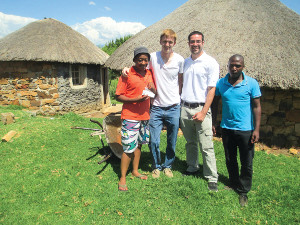launch
PEDALING HOMEMADE POWER
 photo: Daniel Lacks
photo: Daniel LacksCase Western Reserve students Ian Ferre and Sam Crisanti (second and third from left), flanked by National University of Lesotho students Lerato Chapile (left) and Khanyapa Mofilhli (right), visited the Lesotho villiage of Ha Luka earlier this year, where villagers tested their pedal charger.
A rural African village chief sat on a wooden stool, testing a pedal-powered phone charger with a bare foot and pondering its burden-easing potential.
The device—more like a pedal in a car than on a bike—could replace his villagers' more than six-hour round-trip journey to find electricity, he told student-inventors Sam Crisanti and Ian Ferré. The two Case Western Reserve students aim to bring what began as a class project to remote areas of the world that have cellular service but lack power grids.
"Cellphones connect people in remote areas to food, medicine and banking," said Crisanti, a junior majoring in mechanical engineering. "Our research shows that millions of people have access to cellphones but lack the electricity to charge them. We want to close that gap."
Crisanti and Ferré, a junior majoring in mathematics, developed the concept in 2013 during a first-year SAGES seminar called "Engineering for the World's Poorest," taught by Daniel Lacks, PhD, C. Benson Branch Professor of Chemical Engineering.
Lacks was so taken by the idea that he told the students they didn't have to write final papers if they wrote a grant proposal to a U.S. Environmental Protection Agency (EPA) sustainable design program. The EPA awarded the two $15,000 in 2014 to study the feasibility of their concept and build prototypes, which later becameDRthe basis for an additional $75,000 award from the agency in a similar program.
Ferré and Crisanti met the village chief earlier this year when they tested the pedal in Lesotho, a rural African kingdom encircled by South Africa. They camped in tents and collected feedback in the village of Ha Luka. While the pedal needs to be pressed repeatedly for about 2.5 hours to generate the power needed to charge a basic phone, villagers liked that their hands were free to prepare food or do other activities.
The students are now developing a more durable and waterproof pedal. They've also formed Greenlite Technologies LLC, and have begun talking to manufacturers, development agencies and telecommunications companies about possibly distributing and selling the device at a price that's more affordable than more powerful generators on the market.
And they've broadened their expertise, bringing on Ferré's roommate Evan Harris, a junior majoring in finance, to work on business planning and marketing, and Quentin Baker, a junior majoring in mechanical engineering, to help refine the pedal's design.
This spring, team members will head to the Philippines to test the device in areas that experience prolonged electrical outages during monsoon seasons. "In disaster situations," Ferré said, "a phone call can make a difference in survival."






